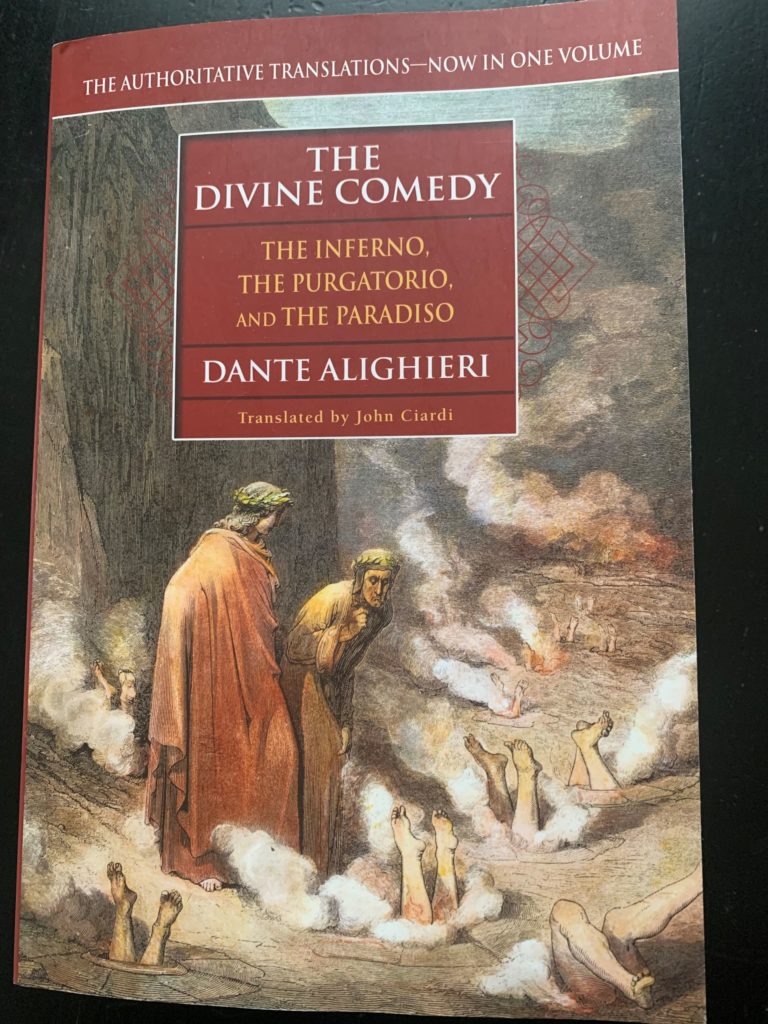This week we are at Circle six. In this level, which is the first of the three inner hell circles and we will see the heretics. I could certainly see why they made it to hell, I almost wonder why it is only level six rather than nine. Is there a bigger sin than actually denouncing god? I guess not, according to Dante.

In Canto IX, Dante and Virgil wait at the gates of Dis to go deeper into hell. The gates are guarded by furies who summon Medusa to attempt to turn them into stone. Virgil responds with a prayer whereby an angel comes and thwarts Medusa and the furies, letting them in.
Canto X takes place once inside the walls. This is a rolling landscape packed full of tombs. Some of them are ‘active’ or open. Out pops someone named Farinata who was a political enemy instrumental in kicking Dante out of Florence. There were several interactions in this Canto. The last Canto wraps up their walk through circle six and a peak into circle seven.
Despite the fact that this was three times the length as we have typically looked at so far, there is about the same amount of information coming out. One or two surface level conversations with an enemy of Dante or someone that he holds in low regard. A chance to put his digs in and make fun of these people.
Is there a difference between heretic and agnostic and atheist? I have to say that Dante thinks so and I agree as well. The term atheist was not around in the 1300s and so they didn’t make it but let’s take a look a the terms themselves. An atheist is someone that does not agree that there is a god. An agnostic differs slightly in that they are potentially open to god but have not seen proof. Whereas a heretic is someone that believes in god but against the doctrine of religion.
This all could be a little confusing but let us just say a heretic would attend church but also believe in ritual sacrifice of Judaism as an example. The new covenant, as the belief in Jesus and resurrection says that there is no longer an intermediary between the believer and god, it was the priest who was sustained by these sacrifices. The priest was the only person allowed behind the veil (or curtain). Going behind the veil was the only permitted way to communicate with god. So, in those days the proxy of god was the priest. This would be practicing contrary to accepted Christian beliefs.
Agnostic and atheist are more subtle in difference. The two terms are sometimes confused by people that don’t have command of the vocabulary. You have to wonder if level one (the pre-Christians) also contains the agnostics? And do the atheists live with the heretics in level 6 or are both in here? I suspect that in those days, it was not safe to proclaim that a person didn’t possess faith.
Again, this is a work of fiction and there has been a lot of water under the bridge since the 1300s. And so, my interpretation and standards I feel differ significantly from the days of Dante. I think about things like the witch trials, I suppose that was a crime of heresy. Interestingly enough that (at least so far) there has been zero interaction with unknown culture. Think about all of the Chinese people that have existed and none of them have been seen in hell to date. I am starting to develop an opinion on The Inferno, which I will share in the wrap-up in about a month.
One thing that kind of puzzles me still is why the tomb sharing? What is the relationship of the tomb to the spirits that reside in them? It was probably convenience of the story more than anything but it is still a mystery to me. I also wonder if Dante is just lucky or do these spirits seek him out? I seems pretty serendipitous that everywhere he goes, he runs into familiar specters.
End Your Programming Routine: I found it interesting that a pre-Christian condemned to hell could pray and summon an angel. That seems spiritually inconsistent. That is what this story is turning out to be. When I read this in high school, I got none of the subtle nuance nor the in depth background of the story. This is a whole new perspective on the Inferno for me. Next week, Canto XII – XVII.
Recent Comments